From Floppy Disks to AI: A Fireside Chat with Adrian Cooper, CEO of Oxford Economics
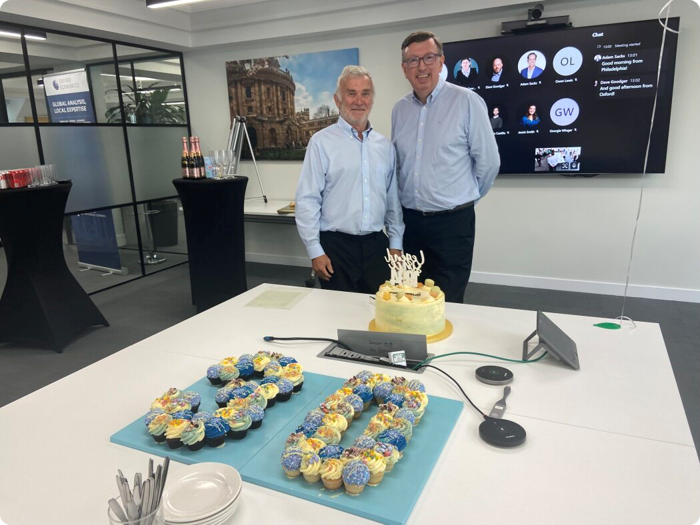
2024 marks a significant milestone for Oxford Economics, as CEO Adrian Cooper celebrates his 30th anniversary with the firm.
Adrian has played a pivotal role in shaping Oxford Economics into a leading global economic research and consultancy firm. In an exclusive interview, we delved into his journey, insights and vision for the future, and we explore his experiences, the challenges he has overcome and the opportunities that lie ahead.
Oxford Economics in its early days
Founded in 1981 with a small team in Oxford, Oxford Economics has since grown into a leading global economic research firm, with over 680 employees across 22 offices worldwide. It was a different world back then: in the early days, before the advent of the internet, the firm distributed its flagship Global Economic Model releases on floppy disks. Adrian reminisced about these humble beginnings.
Q: Can you tell us about your journey with Oxford Economics? What attracted you to the firm, initially?
AC: Prior to joining the firm, I worked at HM Treasury in the UK for seven years, then for an investment bank in London. Back then, I was looking for a role where economics was central, and where model-based forecasting would be part of the role. Oxford Economic Forecasting, as it was called back then, was advertised in the newspaper. I applied and was interviewed by John Walker and two other colleagues, and I was lucky enough to get the job.
When I was first offered the job at Oxford Economics, however, I turned it down. Back then, my wife and I were not sure we wanted to move from London to Oxford, especially as we had negative equity on our house. I look back at that now and what’s happened since; you sort of think as soon as I got that offer, we should have just got in the car and gone for it.
I finally joined the firm on 31 October 1994 in Oxford Economics’ Oxford office.

Q: You mention model-based forecasting as a key element for the role you were looking for then. Why was this important to you?
AC: An economic model is not a crystal ball, but rather a valuable framework for analysing economic trends. While it cannot predict the future with perfect accuracy, it provides a structured approach to understanding the complexities of the global economy. By using models, economists can identify patterns, forecast future developments and assess the potential impact of various economic policies. However, it’s essential to remember that models are tools, not substitutes for human judgment and expertise.
Q: What were the firm’s main services provided in the early days?
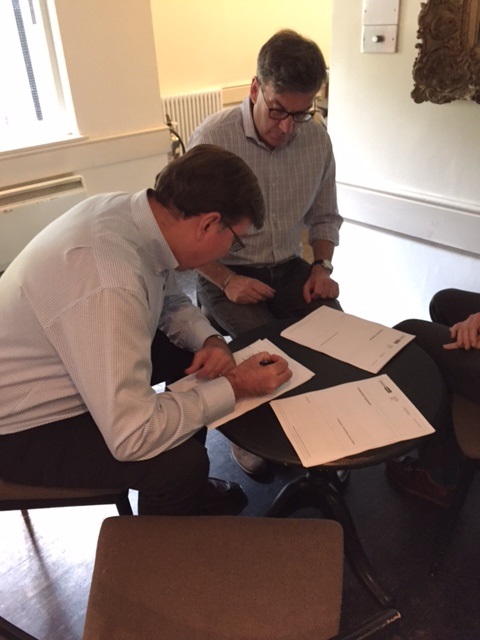
AC: When I joined, there was the Global Economic Model (GEM), which I think only covered 17 countries. Alongside that, we had quarterly reports: one on the world economy and one on the UK economy. We also held quarterly conferences in Oxford and two events in North America each year. But really that was the subscription product set at that point.
The first innovation I introduced was the World Economic Prospects Monthly Review, which fortunately became very successful. Now, you must remember that this was pre-Internet, so what was radical about that was that we wrote the report, printed it and posted it all on the same day, alongside the GEM release. It was the first time we sent anything to clients on a same-day basis. This began to change the rhythm of how we worked as a business, making us much timelier and event-driven in what we could write about. But you literally had to print hard copies of the reports, then save the GEM on floppy disks, stick them in envelopes and post them out.
Q: Can you share more about your first major consulting project, which came about within your initial six months at the company?
AC: My first major project was a study for the British Beer and Pub Association. We aimed to estimate the price elasticity of demand for beer in the UK and assess the impact of duty-free beer purchases from France and Belgium on the domestic market. This project marked the beginning of a long-standing relationship with the association, and it also inspired me to grow our consulting business.
Q: The firm has grown over the years, achieving significant milestones. What are the things we have done right that you think we should keep doing?
AC: The foundation of our success is built on the quality of the staff we have. We are always striving to make sure that we hire and retain exceptional economists, analysts, business development personnel and other top talent, making sure we have the best professionals across all functions of the business. This allows us to genuinely offer clients high-quality services.
Another aspect we have done right and must continue to do is to invest continually in the development of the business, our services and our staff. The philosophy of strong investment to ensure that we have the best product offering has been absolutely critical.
I think that the structure we have established globally, with offices in key markets that combine sales and economists to work with clients on the ground, has been powerful.
The list could be very long, but the final point I would highlight is that we have always had and continue to maintain a genuinely client-centric approach in how we operate the business. We have always been very careful to respond to clients quickly and ensure they are well served. By combining top-tier products with unparalleled customer service, we have built strong, long-lasting relationships with our clients.
Economics and industry development in 30 years
Just as Oxford Economics monitors, studies and forecasts the economy and critical events, these factors also shape the firm’s growth trajectory. Oxford Economics has thrived by providing critical economic insights to businesses during pivotal moments. Looking ahead, disruptive factors like Artificial Intelligence could significantly influence the future of the industry, Adrian believes.
Q: Some of the drivers of the firm’s success as you mentioned are related to the broader economic and industry backdrop. What are some of the biggest trends that have been shaping the economic forecasting and advisory landscape?
AC: One of the things that turned out to be quite helpful in the growth of the business was the world economy becoming more volatile and more uncertain. That, I suppose, really kicked off with the global financial crisis. Prior to then, a lot of economies were very stable and inflation was low. Businesses could sort of feel that the economic environment was relatively safe. What they really needed to focus on was what they were doing themselves and their own competitive position in their markets.
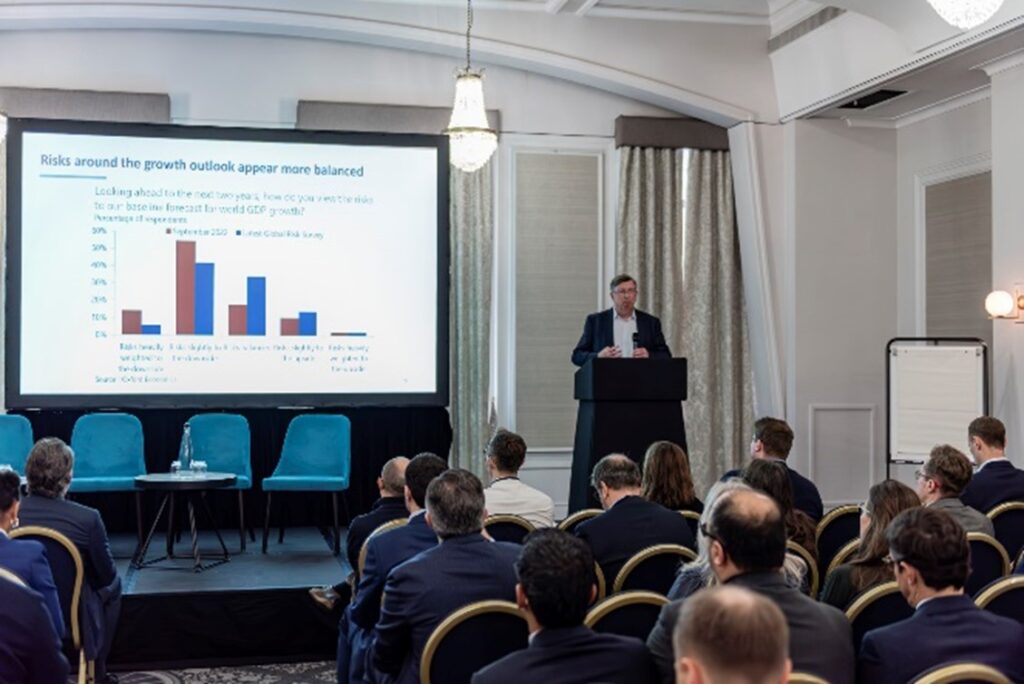
Following the global financial crisis and ever since, the macro economy has become the number one influence on how businesses are performing. This has meant that understanding what is going on in the world economy, what the outlook is, what the risks are, has become more and more important. This has been evident through the global financial crisis, then through things like COVID and all the geopolitical uncertainties we’ve seen in recent years.
Recently I had a meeting with the Head of Credit at a bank, who asked me what I thought the biggest risk to our business was. I said, only half-jokingly, the biggest risk is everything in the world economy going right! Because what we are seeing is that the economic uncertainty has been positive for the development of companies like ours that are able to help clients understand and navigate volatility and align their strategies with business cycles.
Q: Given the rise of AI, particularly tools like ChatGPT, how do you see the future of economic forecasting and consulting?
AC: While AI has the potential to revolutionise many industries, including ours, I believe it will primarily serve as a powerful tool to augment human capabilities rather than replace them.
Tools like ChatGPT excel at summarizing information and generating content. But they often struggle with developing original insights and understanding the nuances of complex economic issues. Human economists, with their critical thinking skills, domain expertise, and ability to interpret data contextually, will remain essential for providing high-quality analysis and advice.
Ultimately, the combination of human expertise and AI technology will likely lead to more efficient and insightful economic research and consulting.
Q: You mentioned “insightful” as a key element of your work. How do you define that term in the context of economic analysis?
AC: Insightful, to me, involves delving deeper into economic data to uncover hidden patterns and nuances that might not be immediately apparent. It’s about interpreting trends, identifying anomalies and changes in behaviour, and understanding the broader implications of economic events. Economists play a crucial role in connecting the dots between various data points to paint a comprehensive picture of the global economy.
By asking the right questions and employing sophisticated analytical tools, we can uncover valuable insights that help our clients make informed decisions. While AI and machine learning can assist in data processing, human expertise is essential for interpreting the results and providing actionable recommendations.
The man, the economist, the CEO
Adrian has spent three decades balancing the roles of economist and CEO. His unique perspective, shaped by a deep understanding of economics and firsthand experience in business leadership, has been instrumental in driving Oxford Economics’ success.
While many CEOs have economics backgrounds, few have followed a direct path from academia to the C-suite. Adrian’s active involvement in the day-to-day operations of the firm has provided him with invaluable insights into client needs, operational challenges and service development. His economic training has also equipped him with a strategic mindset and analytical skills that have been essential to navigating the complex business landscape.
Beyond his professional accomplishments, Adrian is a well-rounded individual with diverse interests. In his younger years, he even pursued competitive ballroom dancing, showcasing his passion for both intellectual and artistic pursuits.

Q: What was your dream job as a kid?
AC: I used to dream of a life at sea, perhaps in the Merchant Navy. The allure of traveling the world and experiencing different cultures was captivating. Fortunately, my career at Oxford Economics has allowed me to fulfill that travel bug, visiting nearly 80 countries. Working with people from diverse backgrounds has been incredibly enriching.
Q: I understand that you competed in ballroom dancing in your youth. How did that impact your work ethic?
AC: You wouldn’t guess this, would you, looking at me now?! It taught me discipline, attention to detail, the importance of having good partners and working well with them, and how to handle a busy schedule.
Q: What are the most important lessons you’ve learned throughout your career?
AC: Hard work, integrity, continuous learning, and calculated risk-taking are paramount. Building strong relationships with colleagues and clients is also essential.
Q: Why is honesty so important to you?
AC: Honesty is the foundation of trust. It’s crucial to be transparent about our capabilities and limitations. By maintaining a high level of integrity, we can build strong relationships with both clients and colleagues.
Q: Looking back, is there anything you would have done differently at Oxford Economics?
AC: In hindsight, we could have been more aggressive in investing in our sales and marketing efforts early on. I’m pleased, however, with the overall trajectory of the firm.
Q: What keeps you motivated after 30 years at Oxford Economics?
AC: A key driver of my satisfaction has been the opportunity to work with exceptional colleagues at Oxford Economics, most notably John Walker. The diversity of our work is truly fascinating. One day, I might be discussing the economic implications of the US election, and the next, I could be exploring the impact of taxation on people’s shopping choices or evaluating potential investments in new technologies. This breadth of work has kept me engaged and challenged throughout my career.
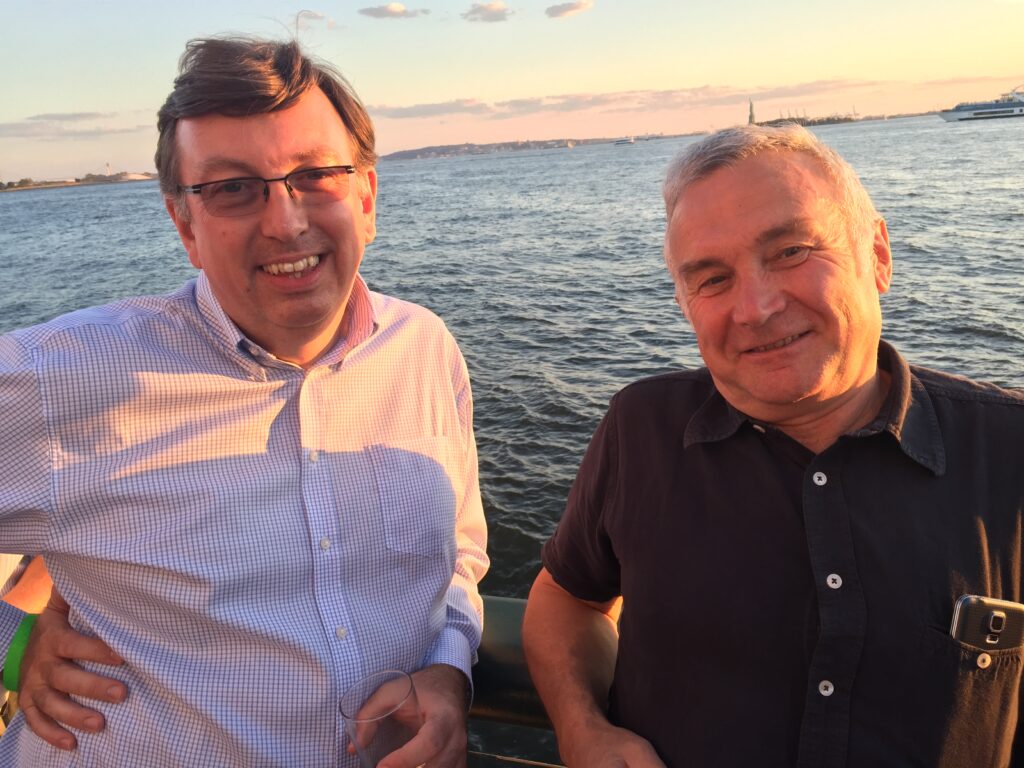
The opportunity to travel the world, meet fascinating people, and learn about different cultures has been incredibly rewarding. Moreover, the intellectual challenge of analysing complex economic issues and providing valuable insights to clients remains stimulating.
Q: What can OE do to retain the next generation of talent and future leaders?
AC: To attract and retain top talent, we need to foster a culture of collaboration, innovation, and professional development. Offering opportunities for growth, challenging work, and a supportive and open environment are key to attracting and retaining the next generation of leaders.
(Special thanks to Erica Okone, Agata Salabura, Debra D’Agostino for providing photos)
Timeline

In 1981, Oxford Economics was founded in Oxford.

In 1994, Adrian Cooper joined Oxford Economics.

In 2005, Tourism Economics joined the Oxford Economics Group, providing actionable and credible analysis of the tourism sector to clients.

In 2015, Oxford Economics Africa became part of the Oxford Economics Group, contributing on-the-ground economic and political insights specific to Africa.

In 2017, Oxford Economics Australia joined the Oxford Economics Group, enhancing local expertise in the Australian and New Zealand economies and industry sectors such as construction and real estate.

In 2021, Oxford Economics launched the online portal for the Global Economic Model, enabling clients to assess this advanced tool with just a few clicks through their browsers. In its 40th year, Oxford Economics had expanded to include over 450 employees in 22 offices around the world.

In 2024, Oxford Economics continues to grow, with over 680 staff worldwide, covering more than 200 economies, 100 sector and 8,000 sub-national locations.
Oxford Economics is the world’s foremost independent economic advisory firm, and we are always looking for top talent to join our expanding team. Click the button below to view our current jobs, placements, and graduate schemes.
On 5th February 2025, Adrian will present at our Global Economic Outlook Conference in London. If you would like to learn more about the conference and secure your spot, click here.
Subscribe to our newsletters
Subscribe to our newsletter to get our insights straight to your inbox. Additionally, you can check ‘Talk to us’ box to have our team contact you about a free trial of our services and how we can support you.
Tags:
Company News

Oxford Economics announces a leadership transition for the next phase of growth
Oxford Economics, the world’s leading economic forecasting and advisory firm, announced today the appointment of Innes McFee as its new Chief Executive Officer, effective 4th December.
Find Out More
Oxford Economics launches enhanced Real Estate Economics Service
Oxford Economics is pleased to unveil its enhanced Real Estate Economics Service, now covering 100 global cities.
Find Out More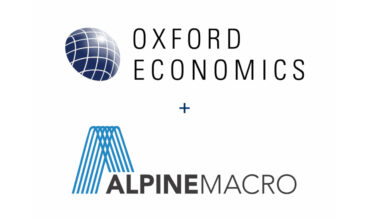
Oxford Economics Acquires Majority Stake in Alpine Macro
We're excited to share that Oxford Economics has acquired a majority stake in Alpine Macro, a prominent global investment research firm based in Montreal, Quebec, Canada.
Find Out More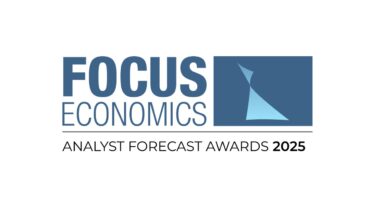
Oxford Economics Leads 2025 Analyst Forecast Awards
We are honoured to receive a total of 103 awards in this year’s FocusEconomics Analyst Forecast Awards. Our team of over 400 economists and analysts demonstrated exceptional forecasting precision in both advanced and emerging economies, including the UK, Italy, Egypt, Brazil, Vietnam and more.
Find Out More